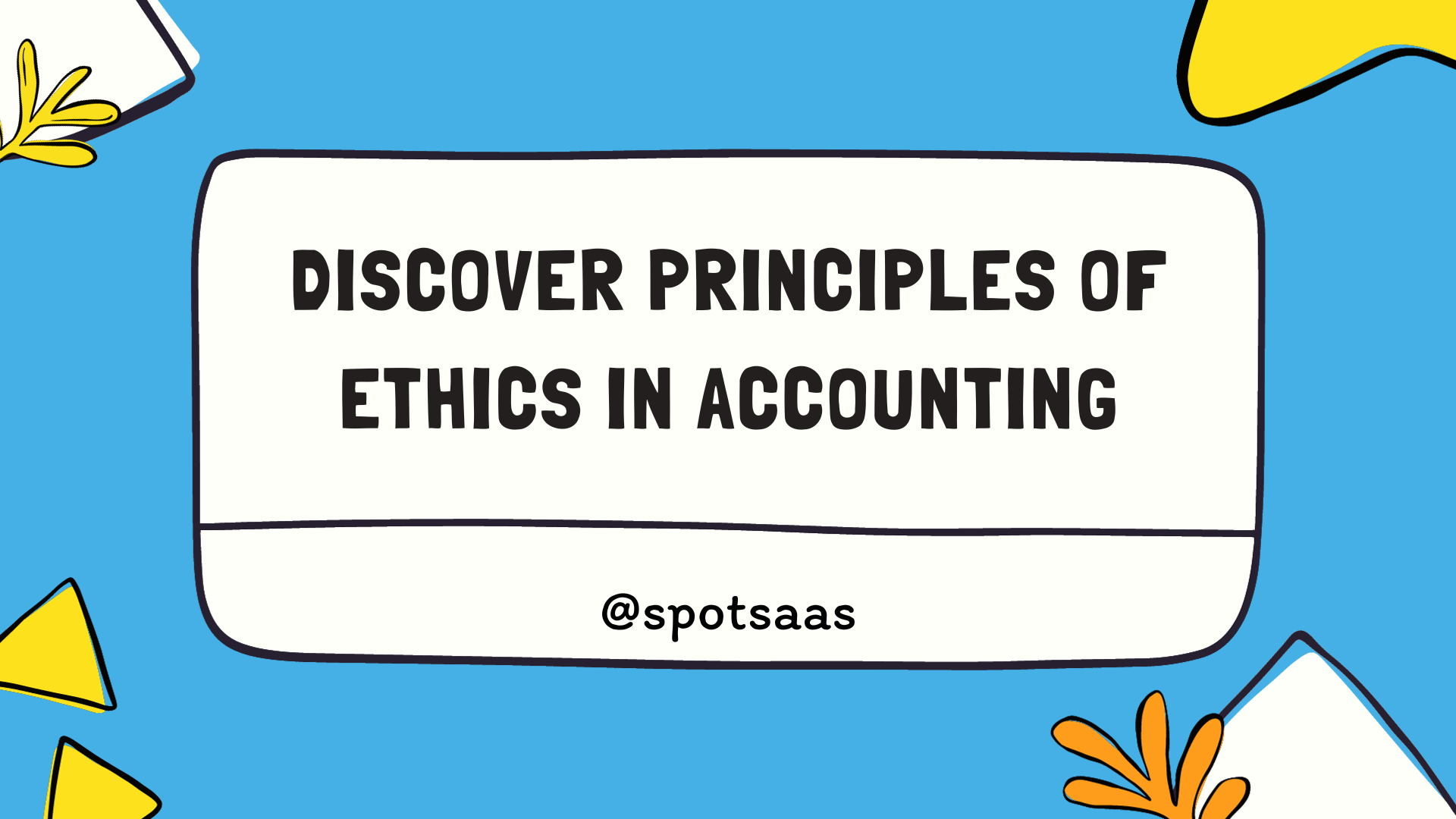As if etched in stone, high ethical standards are indisputably crucial to an accountant’s success and credibility. That’s where this article becomes your beacon of light! We’ve carefully mapped out 6 pivotal aspects of ethics in accounting to ensure you uphold your personal and professional integrity while delivering top-notch service.
Key Takeaways
- Ethics in accounting are crucial for maintaining trust and credibility in the profession.
- Key ethical principles in accounting include integrity, objectivity, professional competence and due care, confidentiality, and professional behaviour.
- Common ethical issues faced by accountants include tax evasion, breach of trust, fraud, conflict of interest, and data manipulation.
- Upholding high ethical standards is necessary to protect clients’ interests and preserve the reputation of the accounting industry.
The Importance of Ethics and Integrity in Accounting
Integrity is a fundamental aspect of the accounting profession, as it ensures that financial information is accurate and reliable. Without integrity, trust in the industry diminishes, leading to serious consequences for both businesses and individuals.
Definition of integrity
Integrity piggybacks on uprightness and honesty in all dealings. It presents itself as an agent of trust, requiring accountants to act truthfully while delivering their professional services.
Integrity is about more than just personal character – it’s a fundamental component within the realm of ethics in accounting. It sets an accountant apart, mandating them to shun false practices such as data manipulation or breach of confidentiality.
The essence is this: integrity means faithfully adhering to ethical standards and best practices in all accounting duties without compromise or deceit.
How integrity relates to accounting
Integrity holds a central role in accounting. Being honest and accurate when compiling and analyzing financial data underpins this profession’s duties. As an accountant, it is my responsibility to adhere strictly to the principles of transparency and accountability.
I must ensure that recorded transactions are precise, factual, and free from errors or manipulations, reflecting sincerity in managing clients’ finances. Upholding professional integrity protects one’s credibility as well as builds trust with clients—a cornerstone for long-term relationships in this field.
Decisions are guided by a stringent sense of moral values; ensuring ethical standards are seamlessly integrated into daily operations maintains the public interest reliably safeguarded – part of the fiduciary duty owed by every accountant.

Why it is crucial for accountants to maintain integrity and ethics
Maintaining integrity and ethics isn’t merely an option for accountants; it’s a requirement. Integrity is one of the pillars of the accounting profession, serving as the foundation of trust between accountants and clients.
It fosters honesty, transparency, and accountability – all fundamental elements that make up an effective and trustworthy accountant.
Ethical conduct in accounting exceeds mere regulatory compliance. It signals to stakeholders that an accountant values moral principles which can have substantial impacts on their professional reputation.
Breach of ethical norms can not only damage this reputation but also lead to severe financial consequences due to penalties or legal actions against them. In essence, holding onto high ethical standards ensures public confidence in financial information while preserving respect for the accounting profession at large.
Checkout Best Accounting Software in 2023
Ethical Principles in Accounting
Ethical principles in accounting include integrity, objectivity, professional competence and due care, confidentiality, and professional behaviour.
Integrity
Integrity is a fundamental principle in the accounting profession. As accountants, we have a responsibility to act with honesty, transparency, and accountability in all our dealings.
Upholding integrity means being truthful and reliable in financial reporting, adhering to ethical guidelines, and maintaining confidentiality when handling sensitive information. By demonstrating integrity in our work, we build trust with clients and stakeholders, ensuring the reliability of financial information and promoting the overall reputation of the accounting industry.

Objectivity
Objectivity is a fundamental ethical principle that accountants must adhere to in their profession. It requires them to approach their work impartially and without bias, ensuring that they are focused solely on providing accurate and reliable information.
Objectivity helps accountants maintain their professional integrity by avoiding conflicts of interest or personal opinions that could compromise the quality of their work. By adhering to this principle, accountants can provide fair and objective financial reports and recommendations, making sure that the interests of all stakeholders are protected.
Objectivity is crucial for maintaining the trust and credibility of the accounting profession as it ensures transparency, reliability, and accountability in financial reporting.
Accounting professionals must always strive to remain objective in their decision-making processes. They should base their conclusions on factual evidence rather than personal beliefs or preferences.
Objectivity also plays a significant role in independent auditing where accountants must critically evaluate financial statements with an unbiased perspective. This allows for an accurate assessment of a company’s financial health while minimizing any potential conflicts of interest between auditors and clients.
Professional competence and due care
Accountants must possess professional competence and exercise due care in their work. This means that they should have the necessary knowledge, skills, and experience to perform their duties effectively.
They also need to stay up-to-date with changes in accounting standards and regulations. By demonstrating professional competence, accountants can provide reliable financial information that stakeholders can trust.
Additionally, exercising due care requires accountants to be diligent and thorough in their work, ensuring accuracy and attention to detail. It is essential for accountants to uphold these principles to maintain the integrity of the accounting profession and meet the expectations of clients and stakeholders alike.
Confidentiality
Confidentiality is a crucial aspect of ethics in accounting. As trusted professionals, accountants have a fiduciary duty to maintain the privacy and confidentiality of their clients’ information.
This includes safeguarding sensitive data such as financial records, personal details, and business strategies. By ensuring confidentiality, accountants demonstrate their commitment to building trust with their clients and upholding professional integrity.
Breaching confidentiality can result in severe consequences, including legal ramifications and damage to one’s reputation. Therefore, it is essential for accountants to prioritize confidentiality and take appropriate measures to protect the confidential information entrusted to them by their clients.

Professional behavior
Professional behaviour is a key aspect of ethics in accounting. As an accountant, it is important to conduct oneself with integrity and professionalism at all times. This means adhering to ethical standards, maintaining confidentiality, and acting in the best interest of clients and stakeholders.
Professional behaviour also involves being transparent in your actions, taking responsibility for your work, and staying up-to-date with industry regulations and changes. By consistently demonstrating professional behaviour, accountants can build trust with their clients and contribute to the reputation of the accounting profession as a whole.
Common Ethical Issues in Accounting
Common ethical issues in accounting include tax evasion, breach of trust, fraud, conflict of interest, and data manipulation.
Tax evasion
Tax evasion is one of the main ethical issues faced by accounting professionals. It involves intentionally underreporting income or inflating expenses to decrease tax liability. This illegal practice not only undermines the integrity of the accounting profession but also has serious consequences for society as a whole.
Accountants have a fiduciary duty to their clients and must ensure compliance with tax laws and regulations while providing accurate financial information. Upholding ethical standards in relation to tax evasion is crucial for maintaining trust, transparency, and accountability in the accounting industry.

Breach of trust
Accountants are entrusted with sensitive financial information, making trust a fundamental element of their profession. However, sometimes accountants face ethical challenges in maintaining this trust.
One such challenge is a breach of trust, which occurs when an accountant fails to fulfil their fiduciary duty and misuses or mishandles client information. This can include intentionally disclosing confidential data, misrepresenting financial statements, or engaging in fraudulent activities.
A breach of trust not only damages the accountant’s professional reputation but also undermines the integrity of the accounting profession as a whole. It is imperative for accountants to prioritize honesty and accountability to prevent any breaches of trust and uphold the highest ethical standards in their work.
Fraud
Fraud is one of the common ethical issues faced by accounting professionals. It refers to intentional deception or misrepresentation of financial information for personal gain. Accountants have a responsibility to identify and prevent fraud, as it undermines trust in the profession and can have severe consequences for businesses and individuals involved.
To combat fraud, accountants must remain vigilant, conduct thorough risk assessments, implement effective internal controls, and adhere to ethical principles like integrity and objectivity.
By maintaining high standards of professional conduct and staying informed about fraudulent practices, accountants play a crucial role in promoting transparency and safeguarding the financial well-being of their clients and the public.

Conflict of interest
In the accounting profession, conflict of interest is a significant ethical issue that can compromise objectivity and integrity. Accountants must always act in the best interest of their clients or employers and avoid any situations where personal interests may influence their judgment.
A conflict of interest arises when an accountant has a personal or financial stake in a decision or transaction they are involved with. This could lead to biased recommendations, manipulation of data, or even fraud.
To maintain professional ethics, accountants must disclose any conflicts of interest promptly and refrain from participating in activities where there is a potential for bias or impropriety.
By managing conflicts of interest effectively, accountants ensure transparency and uphold their duty to act in the public’s best interest.
Data manipulation
Data manipulation is a serious ethical issue in the accounting profession. Manipulating data involves altering or falsifying financial information to mislead stakeholders for personal gain or to portray a distorted view of an organization’s financial health.
This unethical practice undermines the integrity of financial reporting and can have severe consequences for businesses and investors. As trusted professionals, accountants must adhere to ethical principles and ensure that they maintain accuracy, honesty, and transparency when handling financial data.
How to Promote Ethics and Integrity in Accounting
To promote ethics in accounting, it is essential to utilize software that ensures accuracy and minimizes the risk of errors or manipulation. Transparency in reporting should be maintained, with regular audits and checks to ensure accountability.
Creating an open communication environment where ethical concerns can be raised without fear of retribution is crucial. Additionally, prioritizing integrity in hiring and promotions will help maintain a culture of ethical behaviour within the accounting profession.
Use of Software
Software plays a vital role in promoting ethics and integrity within the accounting profession. It helps to ensure accurate and reliable financial reporting by automating processes and minimizing human error.
There are several software which help accountants maintain ethics in accounting, for eg, Quickbooks, Wave, Freshbooks and Xero.
With the use of software, accountants can establish safeguards like internal controls, data encryption, and access restrictions to protect confidential information from unauthorized access or manipulation.
Additionally, the software enables transparency in financial transactions through audit trails and real-time monitoring capabilities. By leveraging technology, accountants can better uphold their professional responsibilities and maintain the highest ethical standards in their work.
Transparency in reporting
Transparency in reporting is a critical aspect of ethics in accounting. As trusted professionals, accountants must provide clear and accurate information to their clients and stakeholders.
This means being open and honest about financial statements, disclosing all relevant information, and avoiding any misleading or deceptive practices. Transparency ensures that all parties involved have access to the necessary information to make informed decisions.
It helps build trust and credibility in the accounting profession by demonstrating accountability and integrity. By maintaining transparency in reporting, accountants contribute to the overall ethical standards of the industry and promote fairness and honesty in financial transactions.

Implementation of checks and balances
To ensure ethical behaviour in accounting, the implementation of checks and balances is crucial. These mechanisms serve as safeguards to prevent unethical practices and promote transparency.
Through regular audits, internal controls, and independent reviews, checks and balances help detect any discrepancies or irregularities in financial records. This process not only provides assurance to clients but also strengthens public trust in the accounting profession.
By establishing clear guidelines for accountability and oversight, accountants can uphold their professional responsibilities with integrity.
Creating an open communication environment
Accountants must prioritize creating an open communication environment to promote ethics and integrity in their profession. By fostering a culture of open dialogue, accountants can ensure that all team members feel comfortable sharing concerns or reporting unethical behaviour.
This encourages transparency and accountability within the organization. An open communication environment also allows for a better understanding of ethical guidelines and provides opportunities for continuous learning and improvement.
Ultimately, it helps to maintain trust among colleagues and clients while upholding the highest ethical standards in accounting practices.

Prioritizing integrity in hiring and promotions
Hiring and promoting individuals with a strong sense of integrity is crucial in maintaining ethical standards within the accounting profession. By prioritizing integrity in these processes, organizations ensure that they are selecting candidates who will uphold ethical principles and make decisions for the greater good.
This helps to build trust among clients, colleagues, and stakeholders while reinforcing the importance of honesty and accountability in the accounting industry. It also fosters a culture of integrity within the organization, leading to increased transparency and ethical behaviour throughout all levels.
Conclusion
In conclusion, ethics in accounting are essential for maintaining trust and integrity in the profession. By following ethical principles such as integrity, objectivity, and confidentiality, accountants can ensure they provide accurate and reliable financial information.
Upholding these standards is crucial for the success of both individual accountants and the overall reputation of the accounting industry.
Frequently Asked Questions
What are the essential aspects of ethics in accounting?
The essential aspects of ethics in accounting include integrity, objectivity, confidentiality, professional competence and due care, professional behaviour, and honesty.
Why is integrity important in accounting?
Integrity is important in accounting as it ensures that financial information is accurate and truthful, maintaining the trust of stakeholders and promoting ethical decision-making.
What role does objectivity play in accounting?
Objectivity plays a crucial role in accounting by requiring accountants to remain unbiased and independent when preparing financial statements or providing advice to clients.
How does confidentiality impact ethical practices in accounting?
Confidentiality is vital as it ensures that sensitive financial information remains secure and protected from unauthorized access or disclosure.
Why is professional behaviour significant for accountants?
Professional behaviour is essential for accountants as it promotes accountability, transparency, and ethical conduct within the profession while building credibility with clients and stakeholders.



